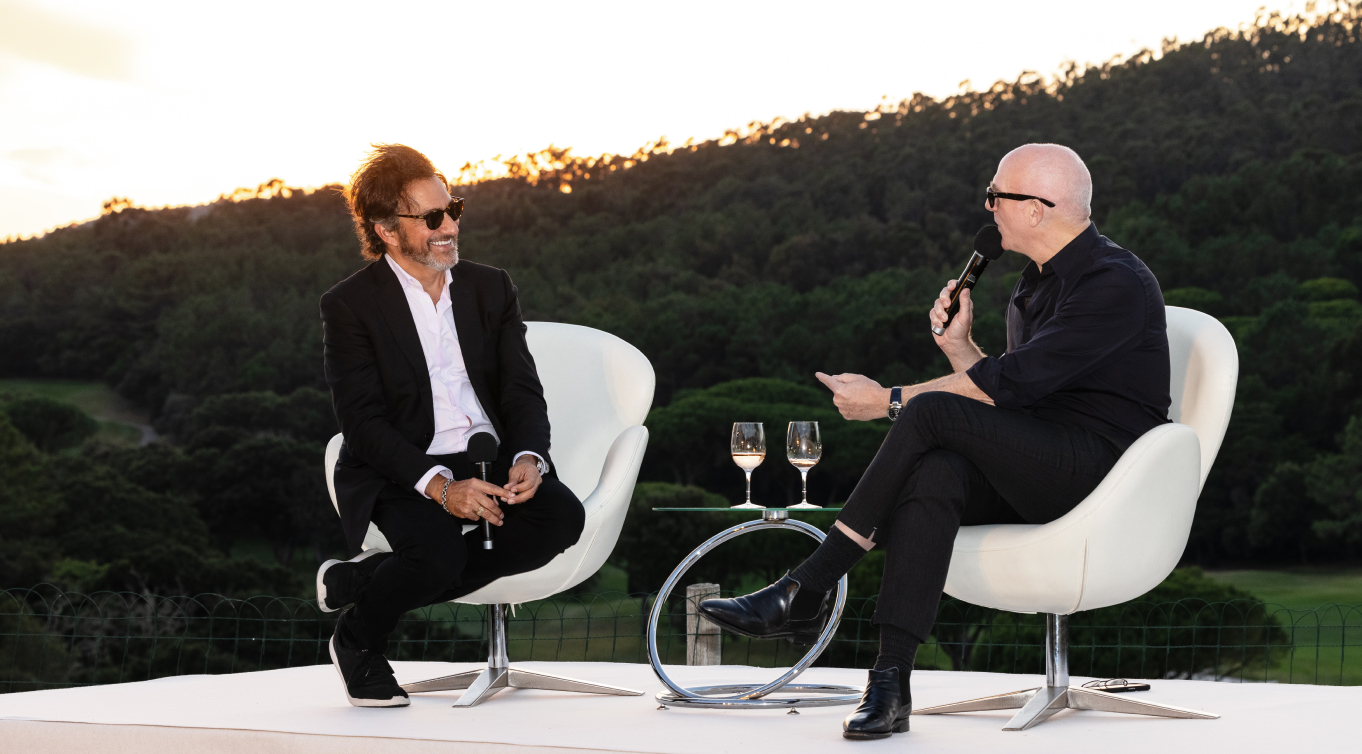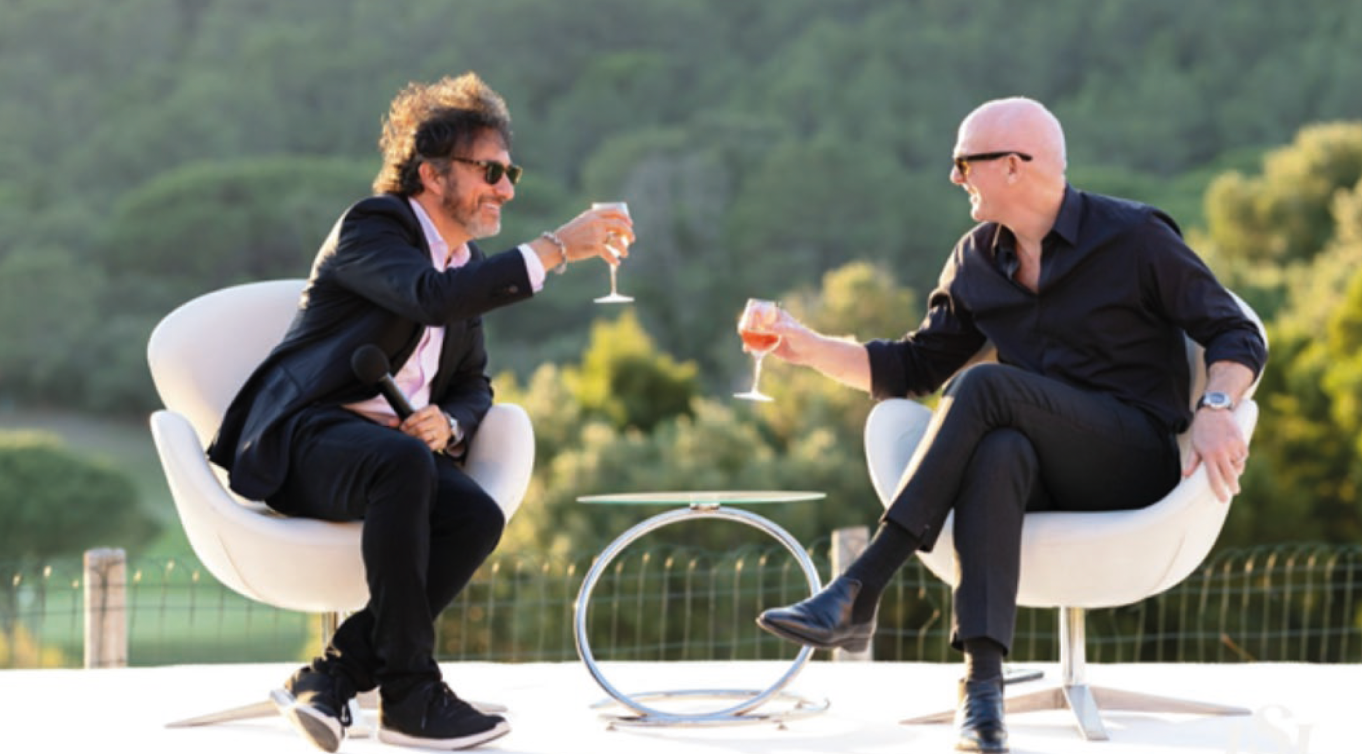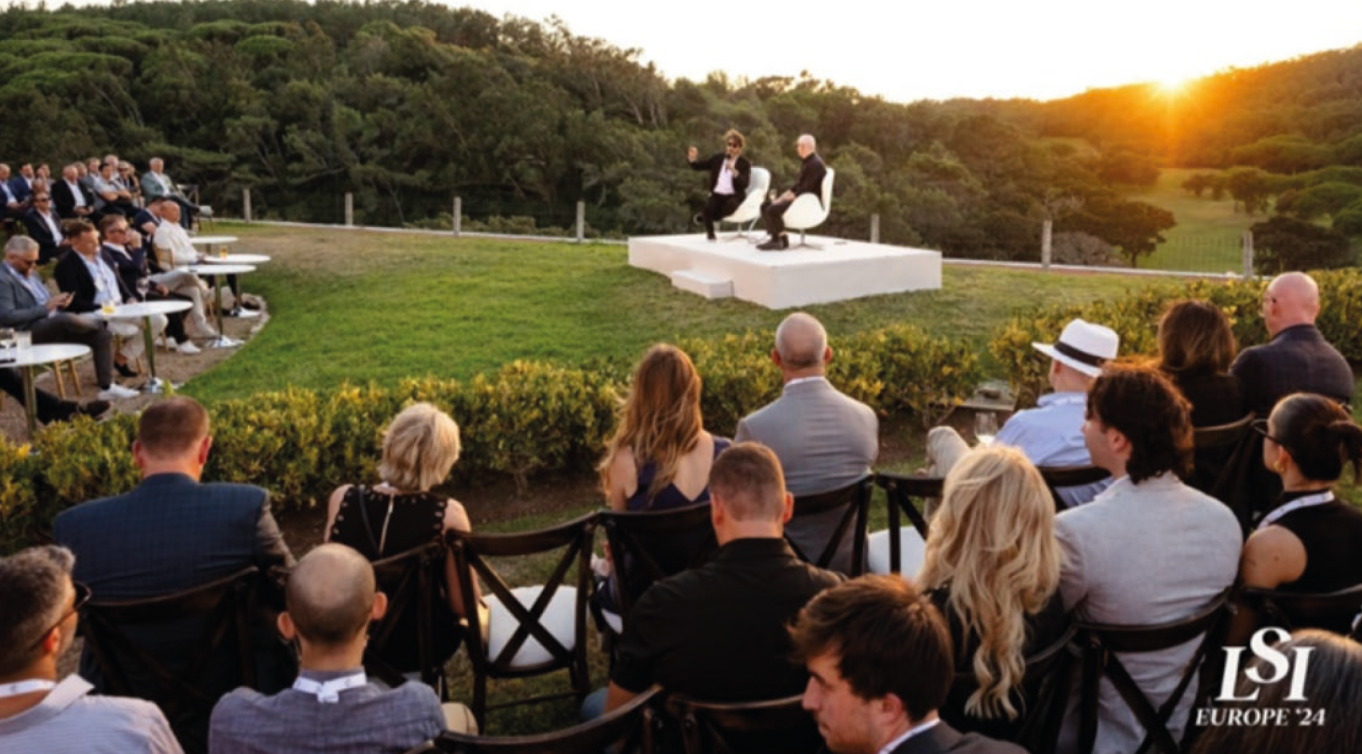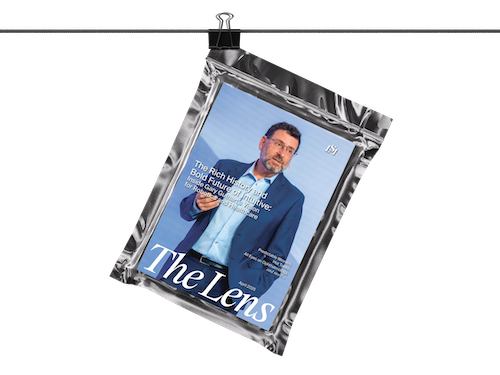
When it comes to revolutionizing medtech, two names carry heavyweight status: Josh Makower, MD, and Antoine Papiernik. These visionaries, both powerhouses in innovation and venture capital, dish out straight talk following Shockwave Medical’s epic exit on what it really takes to succeed in medtech. For entrepreneurs and investors aiming to make waves, they say the magic formula is all about grit, teamwork, a long-haul mindset, and a relentless commitment to a new form of investor collaboration.
As the sun set over Sintra, Portugal at LSI Europe ‘24, with wine in hand and a Mediterranean breeze in the air, medtech icons Josh Makower, MD, and Antoine Papiernik shared hard-won insights with the large audience gathered for their fireside chat. From what it takes to nail today’s device investments to lessons from Shockwave Medical’s monumental exit—and even a few thoughts on mountain climbing—these two mavericks served up the ultimate roadmap for medtech success.
Makower and Papiernik, who have known each other for more than 20 years and have both played key roles in the evolution of the medical device industry throughout their impactful careers, are now collaborating at powerhouse European VC firm Sofinnova Partners, with Makower joining as an Advisory Venture Partner in early 2024. Sofinnova, still aglow from the monumental acquisition of intravascular lithotripsy (IVL) company Shockwave Medical by Johnson & Johnson (J&J) earlier this year, after becoming an early and committed investor more than a decade ago, was a key theme of their discussion.
In today’s dynamic medtech investment landscape, this blockbuster deal sends a clear message to innovators and investors that success hinges on a few key pillars. Makower and Papiernik lay it out: it’s all about the people, a mindset built for the long haul, and an unstoppable commitment to a new wave of collaboration reshaping medtech. Shockwave’s incredible journey—from startup in 2009, to its successful IPO in 2019, to a staggering $13.1 billion exit in 2024—is the kind of victory that every innovator dreams of, and it’s proof that delivering on the right formula can turn ambition into industry-shaking success.

Betting on the Right People
To kick off the evening, Makower asked Papiernik, Sofinnova’s Chairman and Managing Partner, to describe the magic formula that comes into play when he’s making medtech investment decisions. Both agreed that people are everything.
“Companies go through ups and downs, and technology goes through ups and downs, but the people really are at the heart of it,” says Papiernik, who joined the Shockwave Board of Directors in early 2014, at the time of its $12.5 million series A financing. “The team at Shockwave, including the first person we met, co-founder Todd Brinton [MD; now Chief Scientific Officer and Corporate Vice President at Edwards Lifesciences; see his keynote with Makower at LSI Europe ‘24], impressed us. I think the most beautiful thing for me is really the path, and the incredibly talented people, including [CEO] Doug Godshall who executed on the plan.”
Ecosystem relationships build trust, and Brinton has worked closely with both Papiernik and Makower over the years. In addition to co-founding Shockwave along with Daniel Hawkins (whose entrepreneurial DNA has led him back to the helm of another early-stage venture in Khosla Ventures-backed Vista.ai) and John Adams, Brinton worked alongside Makower and team at Stanford Byers Center for Biodesign (now the Stanford Mussallem Center for Biodesign) for 18 years in various roles, including as Innovation Fellowship Director. Brinton is also an Adjunct Professor of Medicine at Stanford University, where he has held multiple roles in cardiovascular medicine for almost 25 years.
Makower agrees that the decision to invest is always all about the people, including patients. “Find those people that you can build something amazing with. If you’re an investor, if you are an entrepreneur, find the investor that you can partner with and see your way through. Build something together to last, and a journey that is transformative—not only for your team and your company, but for the patients. That’s always going to be where the real goal is, that’s why we’re all here. We’re trying to do something good for patients.”
build something amazing with.”
Makower’s passion stems from his multiple successful roles as a venture, general and special partner at NEA, to co-founding and growing Stanford Biodesign’s Innovation Process into a global approach to patient-centered health technology innovation, to being the founder and executive chairman at ExploraMed, a medical device incubator.
Papiernik touched upon another critical point to keep in mind when navigating company growth: when to grow the team.
“People are everything, and you need to understand when you need to grow the team, and be able to bring the appropriate skill set to the company. To grow Shockwave from seven early patients that showed that the technology was possible, to go from there to a billion-dollar company, required huge execution skills. To be able to find those is what’s difficult. Bringing on the right people at the right time is key.”

Smart Risks and Time in the Trenches
Makower spoke from his own experience as a serial founder, investor, and innovation builder. “The way to win is with patience and perseverance. I can remember when Impella CardioSystems went bankrupt twice, then it was reborn and over time it was eventually bought by Abiomed. Abiomed itself was purchased for one of the biggest exits in the history of medtech at the time,” he says. (It was acquired by J&J in 2022 for about $17.3 billion.)
“For entrepreneurs, the story there is if you have a technology you believe in, and you have the data, you just have to stick with it. That’s the message to investors as well. That’s how real value is created. In this business, it’s not created overnight,” Makower continues.
“Shockwave took about 12 years, but some of the other companies that ultimately went there took longer than that, and I think we both have examples of that. Persistence is absolutely key,” added Papiernik.
persistence is absolutely key.”
Makower told the audience that the model for building medtech companies is unusual. “It’s not like other industries where there’s a markup, and then another markup, and another. This is really about derisking capital over time, and as you continue to invest even though the values don’t necessarily click up that much. You’re having a greater opportunity to get in early, and have the chance to have potentially in the long run the largest position in the company. But you only achieve that by following through.”
The Rise of a Powerful Investor Ecosystem
Both Makower and Papiernik noted a powerful phenomenon happening today in medtech investing that wasn’t the case 30 years ago: consortiums of investors. Makower noted that Sofinnova has always been excellent at attracting great investor partners to join a device company financing, and that has been a key ingredient in the firm’s recipe for success.
“If you look at this particular meeting [LSI Europe ‘24] and the list of investors, along with the sheer number of people at this meeting, 30 years ago there was not a single meeting like this, or an ecosystem or community of investors,” says Papiernik. “Today there are dozens and dozens of medtech investors at this conference, it’s made a huge difference to the ecosystem. For start-ups, as you know it’s difficult to raise money, we all know that. But companies actually raise tens of millions and hundreds of millions today, thanks to the robust investment community that was built over the last 20-plus years.”
Makower also has an incredible passion for the industry and for patient-centered innovation, and has had an influential role in the creation of a diverse and thriving device ecosystem over the past 30 years. And, his vast and varied experience gives him a perspective of the space that not many have.
“The real opportunity I can offer others is to be able to see around some corners, and help guide CEOs or other people navigating it so that they can avoid the obvious pitfalls and also to speak the truth about what the challenges are going to be,” he says.
“The thing I love so much about this medtech community is that so many of you are really here to help each other,” he continues.
“There’s something special about medtech where we recognize it’s a challenge, we stand together, and we truly are helping each other. Even when there are direct competitors, it’s more about respect for the opportunity to create value for patients, and a recognition that there can be more than one that services a tremendously large need. Just stepping forward and helping the next generation, being a part of that community of backing early projects and then working together. It’s not VCs competing against each other, it’s about VCs collaborating to ultimately amass the funding necessary to get these deals to a tremendous value.”

Base Camp vs. the Summit
The two thought leaders also offered advice to the LSI Europe ’24 audience by comparing medtech innovation and company growth to the challenge of conquering a mountain.
“It’s about appreciating the journey you’re on, and being ready for it,” says Makower. “It’s like if there’s Mount Kilimanjaro or Everest in front of you. You don’t want to just be looking at Base Camp. You want to be able to look up to the top and appreciate, okay, there’s where we’re going. You bring the right partners or sherpas along with you, bring the right amount of food, the right protective clothing, and then you can scale it. If I can play some of that role, and help entrepreneurs prepare, that’s what gets me excited.”
Papiernik provided his investment viewpoint, pointing to the true scale of global company evolution.
“I remember back in the day thinking Base Camp was actually the top of Everest,” he says. “I thought yes, this is where we need to go, it was all about CE Mark, then you maybe have a path to the U.S., that’s the ultimate, the top of Everest. But then you get there and you think blimey, absolutely not. The goal posts have kept being pushed back over the last 30 years. If you think that’s the top of Everest, you’re going to be disappointed.”
For some companies, handing their company off to a strategic acquirer might be the summit. But Makower describes a profound quote from Bill George, former chairman and CEO of Medtronic, who led the company for many years to become a growth story.
“I remember him saying on stage to an audience just this, ‘you know we are benefiting from all the investment that you guys are making, and you’re selling your companies way too early.’ He was taking those great businesses and then creating multi-billion-dollar franchises out of them. I think he was right, but it is an ecosystem, right? So, recognizing that the venture model has an arc to it, it’s about handing off to the next arc, and that might be the summit for a venture investor. But then it becomes an opportunity for the strategics.”
Papiernik describes that he had several experiences where in hindsight his firm may have sold too early, one being CoreValve, with its transcatheter, transfemoral aortic valve replacement device. “Medtronic is probably happy that we sold CoreValve to them when we did. What if we had stayed? What if we had found the money? But hindsight is 20/20, of course.” (The 2009 deal included an initial payment of $700 million plus additional payments contingent upon the achievement of agreed milestones, with Sofinnova, its greatest shareholder, having led the Series A.)
However, with Shockwave, Sofinnova’s perseverance and faith paid off, and Papiernik and team got to reach the summit. Papiernik left the board after the company’s acquisition by J&J, when sales boomed from $13 million to over $900 million at the time of the IPO. (Side note: The J&J acquisition is already paying off, with FDA clearance of the Shockwave Javelin Peripheral IVL Catheter this October, followed in November with the company unveiling positive first clinical outcomes with the device.)
Speaking to the CEOs in the audience, Papiernik says that kind of surreal deal sounds impossible, but obviously it is possible.
“I’ve lived it once in my career, but this one was a monumental exit. And, it’s a bellwether of what can be if you have the combination of the technology, the market, and the people. You can actually do this and you can find the money to get it done. This deal has transformed the way we look at companies, and we want more of that.”









